
Ultima is a series of open world fantasy role-playing video games from Origin Systems, created by Richard Garriott. Electronic Arts has owned the brand since 1992. The series had sold over 2 million copies by 1997.
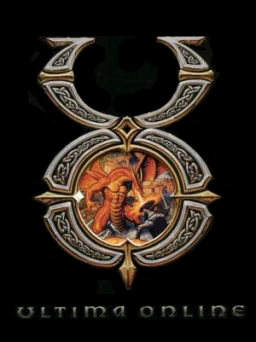
Ultima Online (UO) is a fantasy massively multiplayer online role-playing game (MMORPG) released on September 24, 1997 by Origin Systems.

Origin Systems, Inc. was an American video game developer based in Austin, Texas. It was founded on March 3, 1983, by Richard Garriott and his brother Robert. Origin is best known for their groundbreaking work in multiple genres of video games, such as the Ultima and Wing Commander series. The company was purchased by Electronic Arts in 1992.

The Avatar is the main player character and protagonist in the Ultima series of video games by Origin Systems. The character was first introduced as "The Stranger" in the 1981 role-playing video game Ultima I: The First Age of Darkness.
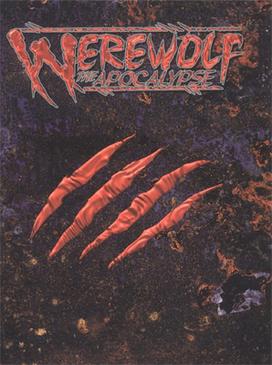
Werewolf: The Apocalypse is a role-playing game of the Classic World of Darkness video game series by White Wolf Publishing. Other related products include the collectible card games named Rage and several novels. In the game, players take the role of werewolves known as "Garou". These werewolves are locked in a two-front war against both the spiritual desolation of urban civilization and supernatural forces of corruption that seek to bring the Apocalypse. Game supplements detail the other shape-shifters.
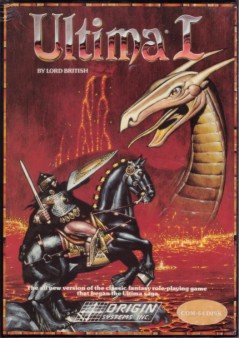
Ultima, later known as Ultima I: The First Age of Darkness or simply Ultima I, is the first game in the Ultima series of role-playing video games created by Richard Garriott, originally released for the Apple II. It was first published in the United States by California Pacific Computer Company, which registered a copyright for the game on September 2, 1980 and officially released it in June 1981. Since its release, the game has been completely re-coded and ported to many different platforms. The 1986 re-code of Ultima is the most commonly known and available version of the game.

Ultima II: The Revenge of the Enchantress, released on August 24, 1982, for the Apple II, is the second role-playing video game in the Ultima series, and the second installment in Ultima's "Age of Darkness" trilogy.
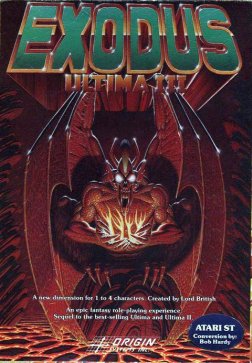
Ultima III: Exodus is the third game in the series of Ultima role-playing video games. Exodus is also the name of the game's principal antagonist. It is the final installment in the "Age of Darkness" trilogy. Released in 1983, it was the first Ultima game published by Origin Systems. Originally developed for the Apple II, Exodus was eventually ported to 13 other platforms, including a NES/Famicom remake.

Ultima IV: Quest of the Avatar, first released in 1985 for the Apple II, is the fourth in the series of Ultima role-playing video games. It is the first in the "Age of Enlightenment" trilogy, shifting the series from the hack and slash, dungeon crawl gameplay of its "Age of Darkness" predecessors towards an ethically-nuanced, story-driven approach. Ultima IV has a much larger game world than its predecessors, with an overworld map sixteen times the size of Ultima III and puzzle-filled dungeon rooms to explore. Ultima IV further advances the franchise with dialog improvements, new means of travel and exploration, and world interactivity.
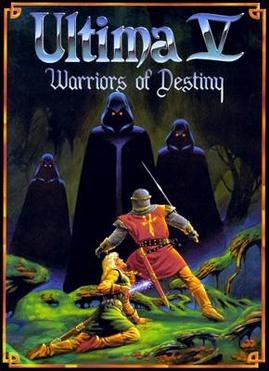
Ultima V: Warriors of Destiny is the fifth entry in the role-playing video game series Ultima released in March 1988. It is the second in the "Age of Enlightenment" trilogy. The game's story takes a darker turn from its predecessor Ultima IV. Britannia's king Lord British is missing, replaced by a tyrant named Lord Blackthorn. The player must navigate a totalitarian world bent on enforcing its virtues through draconian means.

Ultima VI: The False Prophet, released by Origin Systems in 1990, is the sixth part in the role-playing video game series of Ultima. It is the third and final game in the "Age of Enlightenment" trilogy. Ultima VI sees the player return to Britannia, at war with a race of gargoyles from another land, struggling to stop a prophecy from ending their race. The player must help defend Britannia against these gargoyles, and ultimately discover the secrets about both lands and its peoples.
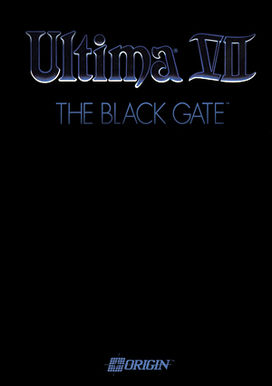
Ultima VII: The Black Gate is the seventh installment of the Ultima series of role-playing video games, released on April 16, 1992. In it the player returns as The Avatar, a would-be paragon of moral virtue who faces down many dangers and deceptions in order to cleanse the medieval fantasy world of Britannia of assorted plots and schemes, monster infestations, and the undermining of crown authority.
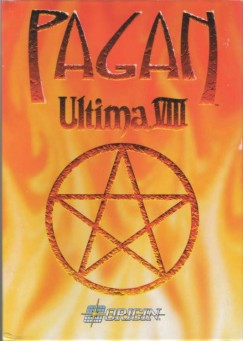
Ultima VIII: Pagan is a role-playing video game, released as the eighth part of the Ultima series. Released in 1994, it is a DOS-only title and is also the first game in the series to be rated M in North America. It was not as well-received as its predecessors, Ultima VII and Ultima VII Part Two: Serpent Isle

Ultima VII Part Two: Serpent Isle is a role-playing video game released in 1993 as part of the core Ultima series, its story beginning eighteen months after the conclusion of Ultima VII: The Black Gate. In Serpent Isle, the Avatar follows Batlin to the eponymous land called Serpent Isle, finding three city-states founded by those who left Britannia generations before and ancient ruins from a still-older lost civilization that was there long before them.

Ultima Underworld: The Stygian Abyss is a first-person role-playing video game developed by Blue Sky Productions and published by Origin Systems. Released in March 1992, the game is set in the fantasy world of the Ultima series. It takes place inside the Great Stygian Abyss: a large cave system that contains the remnants of a failed utopian civilization. The player assumes the role of the Avatar—the Ultima series's protagonist—and attempts to find and rescue a baron's kidnapped daughter.
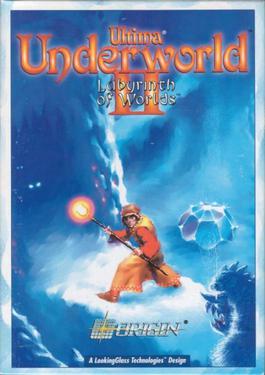
Ultima Underworld II: Labyrinth of Worlds is a 1993 first-person role-playing video game developed by LookingGlass Technologies and published by Origin Systems. As the sequel to Ultima Underworld: The Stygian Abyss, the game is set in the Ultima fantasy universe. Players assume the role of the Avatar—the protagonist of the Ultima series—and adventure through multiple dimensions while seeking to prevent the evil Guardian from achieving world domination. Progression is largely nonlinear and the game allows for emergent gameplay.

Worlds of Ultima: The Savage Empire is a role-playing video game, part in the Ultima series, published in 1990. It is considered a Worlds of Ultima game, as its setting differs from that of the main series. It uses the same engine as Ultima VI: The False Prophet and Martian Dreams. On June 18, 2012, Electronic Arts released the game as freeware through GOG.com.
Mike McShaffry, a.k.a. "Mr. Mike," is a video game programmer, entrepreneur and author. He is known as the director of Ultima VIII: Pagan. He graduated from the University of Houston and began his video game industry career working for Origin Systems in 1990. He worked on titles such as Martian Dreams, Ultima VII: The Black Gate, Ultima VIII: Pagan, Ultima IX: Ascension and Ultima Online. In 1997 he formed his own company Tornado Alley. After that, he worked at Glass Eye Games for a while on Casino games, which were notable for being the first games he worked on that his mom enjoyed playing.
Kirk Winterrowd is an American video game music composer and musician, best known for his work for Origin Systems, namely several of the Ultima titles. He also served as a voice actor in Ultima VIII: Pagan.















